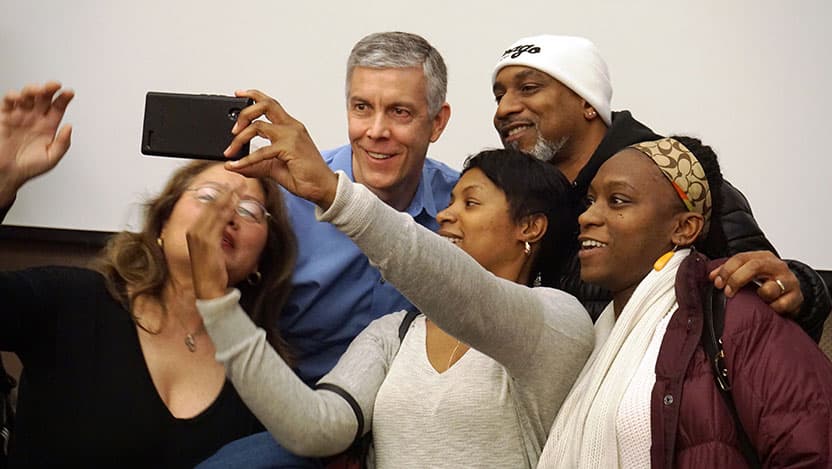Solving Chicago's violence epidemic through job creation: A talk with Arne Duncan

Former U.S. Secretary of Education Arne Duncan knows the solution to Chicago’s gun problem won't be simple. But one answer likely lies in the economic stability of a job.
"While we are failing, while we are in crisis, there is opportunity," said Duncan, who spoke Feb. 7 on Reducing Violence in the City of Chicago as part of the MacLean Center for Clinical Medical Ethics’ interdisciplinary lecture series at the University of Chicago Medicine.
It’s a fact Duncan desperately wants people to understand.
Now managing partner at the Emerson Collective, Duncan is working to reduce gun violence in the city by working with various organizations to allow youths more opportunities.
Duncan, who works with Emerson’s Chicago CRED initiative to employ young men in the legal economy, stressed there are no obvious answers to reducing gun violence. But he also made it clear who wasn’t the issue. He said the young men from Chicago’s West and South sides are not the problem; "they are the solution.”
Getting a job at the local grocery store or park district at age 13 or 14 isn’t necessarily an option in the city’s most economically depressed communities. So, what do these young men do? Sometimes, they hang out on the corner and get involved with gangs.
Is that by choice? Duncan says no: They wind up in these situations not by choice, but because they have no other choice.
This is why organizations like CRED are so important, Duncan said. By using street-level recruitment efforts, participants are placed in groups and paid a minimum wage with the opportunity to earn more based on their performance. Once they graduate from the program, they are placed in permanent full-time jobs with private employers.
At the end of his speech, before a standing-room-only audience, Duncan answered questions about how people and employers can get more involved and lend a hand. Without a group effort, he said, “not much will be done.”
The MacLean Center, which pioneered the formal study of clinical medical ethics in the early 1980s, has become the world’s largest clinical medical ethics program for health care providers. It has trained hundreds of fellows since 1981, including more than 300 physicians.
One of its marquee events, the annual lecture series is in its 36th year. The trauma-focused lectures continue through May and is open to the public. Other topics in the coming weeks include unconscious bias' impact on trauma patients, the cost effectiveness of regionalized trauma care, and gender-responsiveness in socio-surgery.
